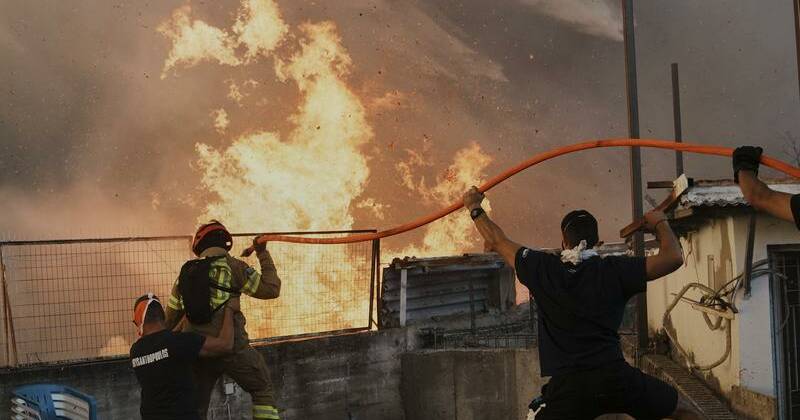
Wildfires, fueled by a relentless heatwave and strong winds, have devastated large areas of southern Europe, resulting in widespread destruction and evacuations. As of August 2025, nearly 440,000 hectares have burned across the continent, which is double the average for this time of year since 2006, according to the European Union Science Hub’s Joint Research Centre. The fires have forced thousands of residents and tourists to flee their homes, particularly in Greece and Spain.
In Greece, wildfires have heavily impacted the outskirts of the city of Patras, disrupting rail traffic and igniting flames that engulfed olive groves and forests. Local volunteer, Giorgos Karvanis, described the scene, stating, “What does it look like? It looks like doomsday. May God help us and help the people here.” Authorities have ordered the evacuation of towns near Patras, including a community of approximately 7,700 residents, and issued alerts for two nearby villages as the fires continue to spread.
The situation is equally dire in Spain, where a volunteer firefighter tragically lost his life while attempting to create firebreaks near the town of Nogarejas in the central region of Castile and Leon. The AEMET, Spain’s state weather agency, has warned that almost the entire nation is experiencing extreme or very high fire risk. This firefighter’s death marks the sixth fatality linked to wildfires in Spain this year, with previous casualties including two firefighters in Tarragona and Avila.
Fire management expert Alexander Held from the European Forest Institute emphasized the need for better preparedness in dealing with wildfires. He highlighted the risks faced by firefighters working in unprepared landscapes, suggesting that authorities create buffer zones and clear combustible vegetation. “Take an industrial building and imagine there would be no fire detectors, no sprinkler systems, no fire protection doors and no escape routes — firefighters would just refuse to go in, but in our landscape we expect them to do this,” he stated.
Financial investments in forest management could also yield significant benefits. According to Greenpeace, an investment of €1 billion (approximately $A1.8 billion) annually could protect 9.9 million hectares, an area comparable to the size of Portugal, and potentially save €99 billion in firefighting and restoration costs.
In recent statements, Sara Aagesen, Spain’s Environment Minister, attributed many of the fires to arsonists, noting their “virulence.” Several individuals have been arrested in connection with the blazes, including a male firefighter charged with igniting fires in the Avila area and a 63-year-old woman under investigation for fires in Galicia’s Muxia region.
Thunderstorms have also contributed to the outbreak of fires. In Andalusia, lightning struck a chestnut and oak forest in Los Romeros, prompting the evacuation of about 250 residents. Fortunately, by Wednesday morning, firefighters had largely controlled the situation. Meanwhile, a wildfire in Trancoso, Portugal, that had been burning since Saturday worsened due to a renewed lightning strike.
In Albania, the situation remains critical, with Defence Minister Pirro Vengu declaring it a “critical week” as the country battles multiple major wildfires. Approximately 10,000 firefighters, soldiers, and emergency units are currently responding to 24 active wildfires.
The ongoing wildfires across southern Europe highlight the urgent need for comprehensive fire management strategies and community preparedness to mitigate the impact of such catastrophic events.






